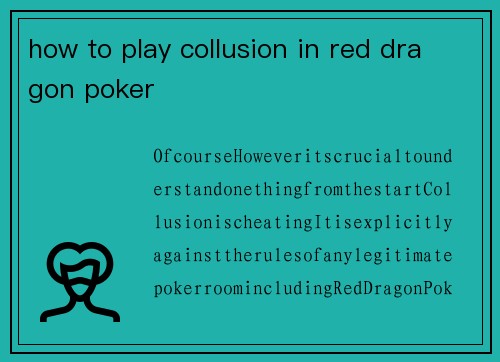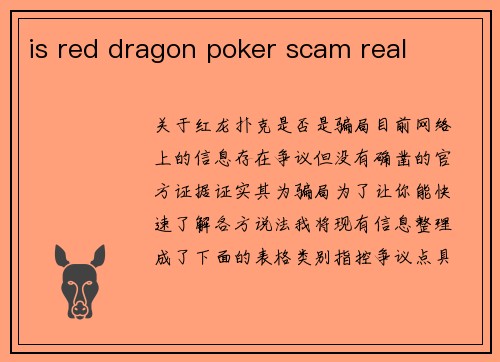how to play collusion in red dragon poker
Of course. However, it's crucial to understand one thing from the start: Collusion is cheating. It is explicitly against the rules of any legitimate poker room, including Red Dragon Poker, and will result in severe penalties, including the permanent loss of your funds and account.
This guide will explain what collusion is, how cheaters attempt it, and—most importantly—how to recognize it and protect yourself. Playing fair ensures the integrity of the game for everyone.
What is Collusion?
Collusion is when two or more players at the same table secretly work together against the other players. This creates an unfair advantage and is a form of fraud. In the context of Red Dragon Poker (or any poker app), common forms of collusion include:
1. Soft Playing: Two partners agree not to bet or raise against each other, allowing one to see cheap flops or get to a showdown without paying.
2. Chip Dumping: One player intentionally loses a large pot to another. This is often done to transfer chips from one account to another or to help a partner qualify for a tournament with a higher chip stack.
3. Sharing Hole Cards: Partners tell each other what their hidden cards are. Knowing that certain cards are "dead" dramatically changes the odds and allows them to play their hands perfectly.
4. Signal Play: Using timing patterns, bet sizing, or even external communication (like a separate chat app) to signal hand strength or coordinate actions.
德扑圈官网How Cheaters Attempt Collusion in Red Dragon Poker
Since Red Dragon Poker is an online app, colluders rely on being able to play at the same virtual table. They might:
* Use Third-Party Communication: They will be on a Discord call, phone call, or text message chain while playing to share their hole cards and plan their strategy.
* Join Low-Traffic Tables/Tournaments: They seek out games with fewer players to increase the probability of being seated together.
* Coordinate Table Selection: They might use friend lists or club features to try and join the same cash game table or tournament.

How to Recognize Potential Collusion (Red Flags)
As an honest player, you need to be vigilant. Here are signs that *might* indicate collusion:
* Unusual Betting Patterns: Two players consistently just call each other's bets, especially when a raise would be the standard play. For example, Player A bets, the pot is large, and Player B just calls with a very strong hand instead of raising.
* Chip Transfers in Obvious Ways: One player goes all-in with a very weak hand (e.g., 7-2 offsuit) against another player who has a premium hand. This is a classic chip dump.
* Consistently Avoiding Confrontation: Two players never seem to get involved in big pots with each other, but are very aggressive against everyone else at the table.
* Instantaneous Calls/Folds: If a player instantly calls a large bet from a specific opponent without thought, it could be because they know their partner is bluffing. Conversely, an instant fold to a small bet might mean they know their partner has the nuts.
* Statistical Improbabilities: You notice that two specific players end up at the same final table or win pots against each other at a statistically unlikely rate.
> Important Note: One or two of these events can be coincidental. Bad players make strange plays. What you're looking for is a consistent pattern of behavior between the same two players over many hands.
How to "Play Against" Collusion (The Right Way)
You don't play *with* collusion; you protect yourself *from* it and report it.
1. Play Tight and Aggressive: Colluders have an information advantage. The best counter-strategy is to play a solid, predictable, and aggressive game. Only enter pots with strong hands, and value bet relentlessly when you have it. They may know you have a good hand, but they can't do much if you force them to pay maximum price to draw out on you.
2. Pay Attention to Table Dynamics: If you suspect two players are working together, your goal is to exploit their primary weakness: they are trying to avoid each other. You can use this by applying pressure when you are in a hand with one of them, as they are less likely to get tricky or bluff-raise you without a monster hand.
3. Leave the Table: The simplest solution. If you feel a game is unfair or "fishy," you are under no obligation to stay. Find another table with honest action.
4. DOCUMENT AND REPORT: This is the most important step. If you have strong suspicions:
* Take Screenshots: Capture the hand history that shows the suspicious action.
* Note the Player Names and Time: Write down the usernames and the time the event occurred.
* Report to Support: Use the "Report" or "Help" function within the Red Dragon Poker app. Send them the evidence and a clear explanation of why you believe collusion is taking place.
Red Dragon Poker's security team has sophisticated software that analyzes hand histories for patterns of collusion. Your report gives them a starting point to investigate.
Conclusion
Playing" collusion is not a strategy; it's a fast track to getting banned. The real skill in poker comes from outthinking your opponents fairly. Focus on improving your own game, be aware of the signs of cheating, and always report suspicious activity to keep the poker ecosystem healthy for all legitimate players.
